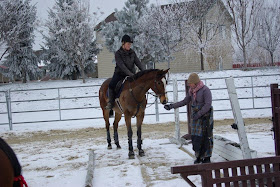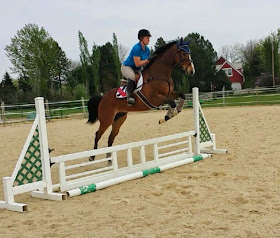 |
| Courage |
Like many adult amateurs, I don't have my own property and have to rely on care provided by others at least part of the time. I've boarded in a good never of different situations and a variety of barns and I've found a few principles to be consistent.
1) You are your horse's best advocate.
I don't care whether you're in a backyard-and-barbed-wire situation or the fanciest show barn in your state. Ultimately, your horse is your responsibility and you can't always trust the BO or your trainer or whoever to make the best decisions for your horse. Ask their advice, certainly, but if you're uncomfortable in any way with the care your horse is receiving, it's on you to speak up and address the problem. You have to be willing to be the PITA boarder if the situation requires it.
That said, if you're having to speak up a lot, the odds are that the situation just isn't going to work for you and you would be advised to move along.
 |
| Self care |
2) Good care varies from place to place.
Just because horses in Florida or Kentucky or Virginia have heated 12x12 stalls and 18 hours of turnouts in grassy fields that never have mud and only ride in a dust-free indoor, well, that doesn't mean it's realistic for you. Instead of worrying about what everyone else has, focus on what's important to you and your horse. My always/only/ever is clean water, good hay, turnout, and shelter. I'm willing to either do my own turnout or have my horse live out with shelter.
There are other things that I love to have, like trail access, good arena footing, jumps, lights, and an indoor, but I'm willing to let go of those things in pursuit of what's more important. Your list will probably vary--some people insist on having an on-site trainer. Others want stalls. Others hate stalls. It doesn't really matter. Just know what's important to you when you're looking for a barn.
 |
| Living on full care pasture with shelter |
3) Pick your favorite crazy people.
Horse people are nuts. It's just part of who we are. That said, different people can deal with different levels of nuts. I will deal with a neat freak BO. I will deal with a BO that only boards one gender of horses. I will deal with a BO that never wants horses to get rained on.
I will not deal with a BO who always/only/ever insists on one style of horse maintenance or is anything other than a fanatic about clean water. Once you get beyond basic health concerns, this one is all personal preference. I also try to be alert about other boarders--if the BO is great, but all the boarders are nuts, it may not be the right fit for me.
 |
| friends to ride with |
4) Know what you want out of a situation.
Obviously, you're going to get something different out of pasture board/no indoor/no trainer situation than you are out of a full care/show barn/mandatory lessons situation. Both are fine, but know want you want. At this point in my life, I'm a happy ammy. I want good horse care, lots of turnout, and nice people to chat with.
I looked at a barn with excellent care that I absolutely loved, but it was a very small facility and I would usually be riding alone. I didn't go for it because I like having someone to ride with--that's the big perk of boarding, isn't it?
 |
| different strokes for different folks |
5) Be honest with yourself about who you are
One of my favorite boarding situations was at a Morgan breeding farm populated by a mix of natural horsemanship and western folks. There was no on-site trainer, but the people were lovely and we were all just boarders on equal footing. The drawback to a training barn situation is that a trainer is obligated to focus on the clients who put food on their table--if you aren't one of them, you can't be the priority. That's the way life goes.
That said, I've been riding a long time and am ok doing most of the training of my horse on my own. I enjoy regular lessons (when I can afford them), but at this point in my life, I prefer being the occasional haul-in. I'd sing a different tune if I had different work obligations or higher show goals or a limitless budget (maybe. I love my barn.). It's just something to be aware of.
 |
| Finding our happy place |
Boarding is just such a love/hate situation. It's constantly dealing with a whole set of very passionate people who may or may not see eye to eye with us. It can be a lot of fun, but it's important to have set standards going in and be honest about them.
These are my favorite principles to stick to and I have epic spreadsheets to prove it. What are some other important concepts to keep in mind when researching boarding barns?

















































.jpg)

